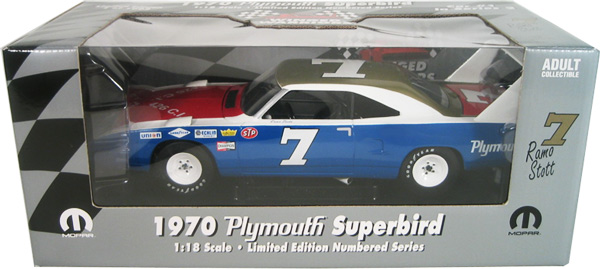
- Anson
- AUTOart
- Bburago
- Bigtime Muscle
- DUB City
- Ertl (AutoWorld)
- GMP
- Greenlight Collectibles
- Highway 61
- Hot Wheels
- Hot Works Racing
- Jada Toys
- Kyosho
- Lane Exact Detail
- Maisto
- Motor City Classics
- MotorMax
- Ricko
- Shelby Collectibles
- Signature
- SunStar
- UT Models
- Welly
- YatMing Road Signature

- Aston Martin
- BMW
- Bugatti
- Cadillac
- Camaro
- Chevelle
- Chevrolet
- Chrysler
- Corvette
- Datsun
- Delorean
- Dodge
- Ferrari
- Ford
- Honda
- Impala
- Koenigsegg CCX
- Jaguar
- Jeep
- Lamborghini
- Land Rover
- Lexus
- MG
- Mercedes-Benz
- Mopar
- Mustang
- Nissan
- Oldsmobile
- Plymouth
- Pontiac
- Porsche
- Shelby
- Subaru
- Toyota
- Viper
- Volkswagen

- Muscle Cars
- Baja 1000 Trophy Trucks
- Movie & TV Show Cars
- Race Cars
- Presidential Limousines
- 1320 Dragster
- Antique Pre-1950 Cars
- Import Racer
- Diecast Police Car
- Exotic Supercars
- 1/64 Scale Diecast Cars
- Motorcycles
- Dodge Challenger
- Jada Toys 1/24
- Maisto Pro-Rodz Series
- Fast and Furious Movie Cars
- 1/16 Highway 61 Trucks
|
1970 Plymouth Superbird 426 #7 Ramo Stott (MIC) 1/18
 EASY ORDER INFO HERE The '70 season saw the introduction of the Plymouth Road Runner SuperBird and a season where super speedways were dominated by the Daytonas and SuperBirds. Due to a NASCAR rule change for 1970, Plymouth had to build one SuperBird for every two Plymouth dealerships, about 1935 units, as compared to 500 units for the Charger 500 and Charger Daytona in 1969. (the number of SuperBirds produced is believed to be about 1935, and the number of Daytonas produced is believed to be about 503. Even Chrysler does not know for sure how many of each model was produced). The 1970 season also saw the first of something that has continued until today--restrictor plate racing as speeds then at Talladega and Daytona neared the 200 MPH mark. For 1970, Richard Petty and Petty Enterprises returned to the embracing arms of Mother Mopar. About the change back to Plymouth, Richard Petty is quoted by Greg Fielden as saying: "Guess you can say that we're headed back home. It'll be like rejoining family. The big reason is the new SuperBird. We feel Plymouth now has a car that will get the job done on the big tracks. Before, we felt like we were at a big disadvantage on the super-speedways." "We had a one year contract with Ford which was renewable," he continued. "We chose not to renew it. The deal we have with Chrysler calls for us to run two cars on the superspeedways and one car on all the smaller tracks. I will run the car on the short track and go for the point title." Pete Hamilton drove the other Petty Plymouth on the superspeedways.
Fielden quoted the general manager of the Chrysler-Plymouth Division, Glenn E. White, as saying that he was extremely happy to have Petty back "home". White said that, "Flags at over 3,400 dealer show rooms have been flying at half-staff since Petty left us a year ago. Now they are at full staff." Pete Hamilton drove the Petty Plymouth Road Runner SuperBird to victory in the Daytona 500. Interestingly, a big red triangle was painted on the nose of Hamilton's Petty Blue #40 SuperBird. The red was painted on the car so that the crew could more easily distinguish between the cars in their stable as they sped toward them on pit road. On May 9, 1970, at Darlington, Richard Petty suffered major injuries in an accident that is arguably the worst of his career while driving his Road Runner. He had wrecked his SuperBird in practice and was driving his short track Roadrunner that his crew had gone back to the shop in Level Cross, North Carolina to retrieve. Car #7 was manufactured by Nichels Engineering, based on a bare "body in white" chassis received by Ray Nichels from Chrysler in late '69. It was the first Plymouth Superbird model to win a race, the ARCA 300 on February 15, 1970, driven by Ramo Stott. It was the only Chrysler winged car (Dodge Daytona or Plymouth Superbird) to compete in NASCAR, ARCA, and USAC races. Ramo Stott drove this car in 11 races, winning (2) ARCA and (1) USAC race. Overall, Ramo Stott won over 400 times driving from 1950-1976 and won National Championships. This Plymouth Superbird competed under numbers 7, 47, and 77 and was also driven six times by Lee Blankenship while competing in a total of 17 race events from 1970-1972. Currently the car is being completely restored by Ken Noffsinger and will remain a Hemi Winged Warrior. MIC Diecast No. 29559 - Sponsor decals include STP, Union 76, Goodyear Tires, Champion Spark Plus, NAPA Echlin Ramjet, Regal Ride Shock Absorbers |







































